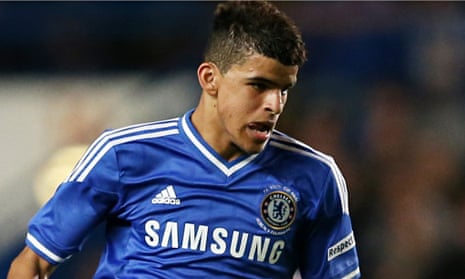For the fourth successive season, Chelsea’s Under-18s have reached the final of the FA Youth Cup. Their youngsters won their two-leg semi-final against Tottenham Hotspur last Wednesday and either Manchester City or Leicester City will stand in the way of their hopes of retaining the trophy they won in dramatic circumstances against Fulham last year.
After a fortnight of self-loathing brought on by the failures of English sides in Europe, that sounds quite promising. Fast-forward 20 years and perhaps Chelsea’s Class of 2015 will busily be ruling the punditry world, making films and opening hotels and restaurants. Perhaps.
Or perhaps not. The culture of bringing through young players at Chelsea is not strong and there is every chance this bright generation will never make it at Stamford Bridge. John Terry is the last academy product to succeed at Chelsea and he made his debut in 1998. Teenagers might be the future, but it is hard for big clubs to hold their nerve and place their trust in youth when money, jobs and reputations are on the line.
Yet taking a long-term view could be beneficial at the highest level. The best sides in the Champions League have tended to contain a core group of academy or homegrown players who have progressed together. Pep Guardiola’s Barcelona would have been nothing without the La Masia production line, while Bayern Munich have Bastian Schweinsteiger and Philipp Lahm and seek to bring the best German talent to Bavaria. It is not about jingoism, it is about strengthening a side’s identity.
Look at the Premier League’s European champions. Manchester United had the Class of ’92 in 1999, while Ryan Giggs and Paul Scholes were still around to help Michael Carrick, Rio Ferdinand and Wayne Rooney in 2008. Liverpool had Steven Gerrard and Jamie Carragher in 2005. Terry and Frank Lampard were Chelsea’s leaders in 2012.
Which is not to say Chelsea, whose title push continues at Hull City on Sunday, should throw the kids in now. The timing has to be right and José Mourinho was pragmatic on bringing in young players.
“If they are good enough and if they are ready, yes,” he said. “It is important but this club is very demanding. It is a club where it is not easy to play football. The level of demand is high. The pressure is big. It is not the same to play in a club where people just accept a so-so performance, or a so-so result or people accept that you finish fifth, sixth, seventh or eighth. This is not the best habitat for a young player to be developed. It is not the best one.”
British players are more established at Arsenal and Liverpool, where there is arguably more patience than at Chelsea and City. Yet Chelsea have a talented crop of youngsters. Isaiah Brown, Dominic Solanke and Lewis Baker are spoken of highly, while Mourinho mentioned Ruben Loftus-Cheek as a potential first-team player next season.
“For a player to play in the Chelsea first team, they must be ready,” Mourinho said. “There is no space with this level of demand and responsibility and pressure, there is no space for a player that is not ready. For example, when did I play Solanke? I played Solanke while winning 5-0 against Maribor, in a competition where we qualified easily in the group phase. I cannot play Solanke against Southampton with 30 minutes to go and the score at 1-1. I can’t.”
But when can they play? “I work them, I bring them to the first-team squad every day when I feel the level is almost there, to try to make the player ready,” Mourinho said. “That is what I am saying. I think next year Ruben will be ready.
“Pre-season he will start with us immediately. Not like this season because this season he joined us only in December. Our pre-season will have three big clubs as opponents in friendly matches. This is another experience for him. So I think next year Ruben is ready, also mentally, to cope with that.”
Encouraging words from Mourinho but actions always speak louder.
